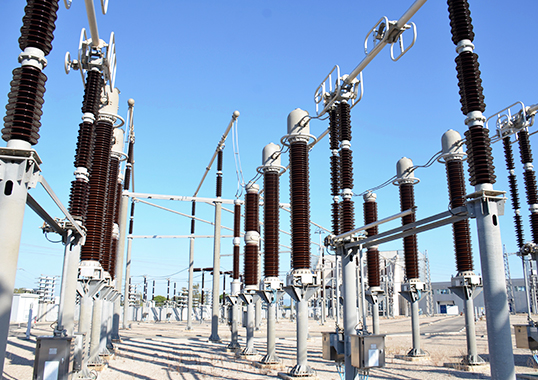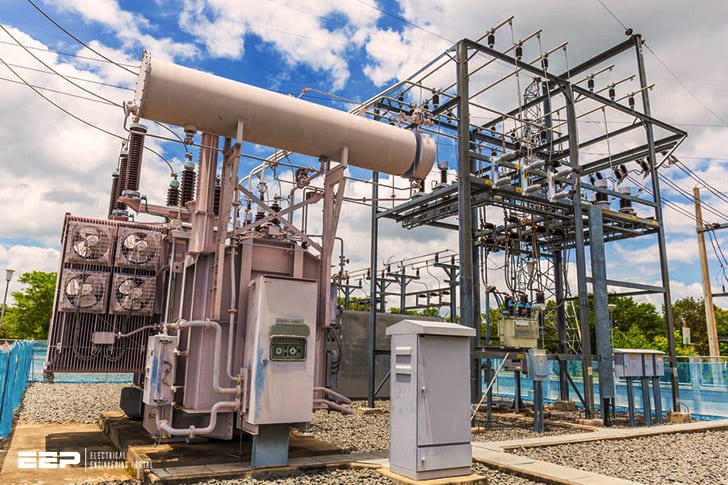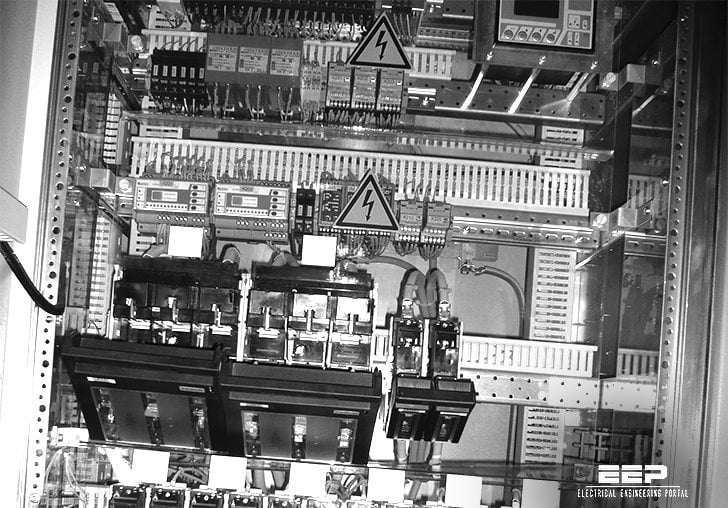An insulator is a material that does not allow electricity to flow freely through it. This makes it an essential component of electrical equipment, like substations. Substation insulators are designed to keep electricity from flowing into the ground or other parts of the substation where it could cause damage or create a safety hazard.
There are many different types of substation insulators, made from materials like porcelain, glass, rubber, and plastic.
Substation Insulators
If you’re in the business of power distribution, then you know that substation insulators are a vital part of your infrastructure. Without them, electrical current would arc between conductors, causing all kinds of problems.
That’s why it’s important to choose the right substation insulator for your needs.
There are many different types of substation insulators on the market, each with its own advantages and disadvantages. For example, porcelain insulators are very strong and durable, but they’re also brittle and can break easily if struck by something heavy.
Glass insulators are less likely to break, but they’re not as good at resisting moisture and corrosion. Composite insulators offer a happy medium between these two extremes, offering good strength and durability while still being resistant to moisture and corrosion.
No matter which type of substation insulator you choose, make sure it’s rated for the voltage and current that you’ll be using.
Otherwise, you could end up with some serious problems down the line.
Substation post insulators
Maclean Insulator Catalog
The Maclean Insulator Catalog is a reference guide for insulators and their applications. The first edition of the catalog was published in 1892, and it has been updated periodically since then. The most recent edition was published in 2012.
The catalog includes information on different types of insulators, their dimensions, electrical properties, and recommended uses. It also includes illustrations and photographs of some of the more popular types of insulators.
If you are interested in learning more about insulators or are looking for a specific type of insulator, the Maclean Insulator Catalog is a great resource to consult.
Lapp Insulators
Lapp Insulators is a leading manufacturer of high quality electrical insulation products. The company was founded in Germany in 1896 and today has manufacturing facilities around the world. Lapp Insulators’ products are used in a variety of applications including power generation, transmission and distribution, electronics, automotive and renewable energy.
Lapp Insulators’ products are made from a variety of materials including porcelain, glass and plastic. The company’s porcelain products are renowned for their high dielectric strength and mechanical strength. Glass products from Lapp Insulators offer excellent electrical properties and chemical resistance.
Plastic insulation materials from Lapp Insulators have good dimensional stability and resistance to chemicals and UV light.
Lapp Insulators provides comprehensive technical support to its customers worldwide. The company’s engineers have expertise in a wide range of technologies including insulation design, material selection, testing and manufacturing processes.
Lapp Insulators also offers training courses on electrical insulation theory and practice.
Post Insulators
There are many different types of post insulators available on the market today. They are used in a variety of applications, including electrical and telecommunications equipment, as well as for industrial purposes. Post insulators can be made from a variety of materials, including glass, ceramic, porcelain, and plastic.
Each type of material has its own set of benefits and drawbacks.
69Kv Insulators
Insulators are devices that are used to prevent the flow of electricity. They are made of materials that do not conduct electricity, such as glass or porcelain. Insulators are used in electrical equipment to protect against electrical shocks.
The most common type of insulator is the 69Kv insulator. These are made of a material called polyethylene, which is a plastic that does not conduct electricity. 69Kv insulators are used on power lines and in electrical equipment to prevent electrical shocks.
Maclean Insulators
Maclean Insulators is one of the oldest and most experienced insulation contractors in Canada. We have been providing quality insulation services to home and business owners in Toronto and the GTA for over 60 years. We are a family-owned and operated business, and we take pride in our workmanship.
Our goal is to provide our customers with the best possible products and services at competitive prices.
Station Post Insulators
Station post insulators are used on high voltage power lines to provide support and insulation. The most common type of station post insulator is the porcelain station post insulator. Porcelain station post insulators are made from a blend of clay and minerals that is fired in a kiln.
The firing process creates a hard, non-porous material that is resistant to electrical current.
Porcelain station post insulators can be manufactured with either a solid body or hollow core. Hollow core station post insulators are typically used on lower voltage power lines while solid body station post insulators are used on higher voltage power lines.
Station post insulators can also be made from glass, rubber, or composite materials.
Glass station post insulators are made from silica sand that is melted and formed into shape. Glass station post insulators have good electrical properties but are susceptible to breakage.
Rubber station post insulators are made from synthetic rubber compounds and have good resistance to weathering and chemicals.
Hubbell Insulators
If you work with or around electricity, then you know that insulators are a vital part of ensuring safety. And when it comes to insulators, there is no better name in the business than Hubbell. In this blog post, we’ll take a closer look at Hubbell and their line of insulators to see what makes them the best in the industry.
Hubbell has been in business since 1888 and has been making high-quality electrical products ever since. One of their main product lines is insulators, which they have been manufacturing for over 100 years. They offer a wide variety of insulator types and sizes to suit any application, from high-voltage power lines to delicate electronic circuits.
What sets Hubbell apart from other manufacturers is their attention to detail and commitment to quality. Their products undergo rigorous testing before they ever reach the market, so you can be sure that they will perform as expected in even the most challenging environments. Additionally, all of their products are backed by a strong warranty, so you can be confident in your purchase.
If you’re looking for the best possible protection for your electrical systems, then you need look no further than Hubbell’s line of insulators. With their dedication to quality and safety, they are the clear choice for anyone who needs reliable insulation solutions.
Transmission Insulators Manufacturers
Are you in search of a reliable transmission insulator manufacturer? If so, look no further than us. We have been in the business for many years and have gained the trust of our clients by providing them with high-quality products at competitive prices.
We offer a wide range of transmission insulators that are designed to meet the specific requirements of our clients. Our team of experts works closely with our clients to understand their needs and develop a solution that is tailored to their specific application.
We use state-of-the-art manufacturing facilities and employ the latest technologies to produce our products.
This allows us to maintain a high level of quality control and ensure that our products meet the highest standards.
Our products are backed by a team of skilled engineers who are always available to provide support and assistance. We also offer a comprehensive warranty on all our products, so you can be confident that you are making a wise investment when you choose us as your transmission insulator manufacturer.

Credit: www.macleanpower.com
What is the Function of an Insulator?
An insulator is a material that does not allow electrons to flow freely through it. This means that it does not conduct electricity. Some examples of insulators are rubber, glass, and air.
How Many Types of Insulators are There in Transmission Lines?
There are three types of insulators used in high voltage transmission lines: string, suspension and dead end.
String insulators are used on the top section of the transmission line where the conductor is supported by a metal tower. The string insulator consists of a porcelain or composite core with metal end fittings that screw onto the conductor.
The bottom of the string insulator is attached to the tower by means of an insulated crossarm.
Suspension insulators are also used on the top section of the transmission line where multiple conductors are suspended from a single point on the tower. The suspension insulator consists of several ceramic or glass discs that are joined together by metal end-fittings.
The bottom of the suspension insulator is attached to an eye bolt which is in turn fastened to the support structure.
Dead end insulators are used on the lower section of the transmission line where only one conductor is supported by a single pole or structure. The dead end insulator consists of a porcelain or composite core with metal end-fittings that screw onto either side of the conductor.
One side of the dead end insulator is then bolted or clamped to its support structure whilethe other side terminates in a free air gap.
How Do Power Line Insulators Work?
An insulator is a material that does not allow electricity to flow freely through it. This means that when an electrical current tries to pass through an insulator, the current is blocked and cannot continue flowing. Power line insulators are made of materials like glass, porcelain, rubber, or plastic, which are all good electrical insulators.
The purpose of an power line insulator is to keep the current flowing through the power lines from coming into contact with anything else that it might touch and cause a short circuit. For example, if the power lines were not insulated, then the current could come into contact with trees or other objects near the lines and cause them to catch fire. Another reason why power lines need to be insulated is because high-voltage power lines can give off dangerous sparks.
If these sparks were able to jump from the line to something else nearby (like a person), it could seriously injure or even kill them.
Power line insulators are usually made of ceramic or porcelain materials.
What are the Advantages of Post Insulators?
One advantage of post insulators is that they can be used in a variety of applications. Post insulators are also very versatile, and can be used in a number of different ways to create different looks. Additionally, post insulators offer a high level of protection from the elements and are very easy to install.
Conclusion
Substation insulators are one of the most important components in a substation. Without them, the equipment would be subject to damage from high voltages. Substation insulators are designed to protect equipment by providing a barrier between live electrical conductors and grounded surfaces.



